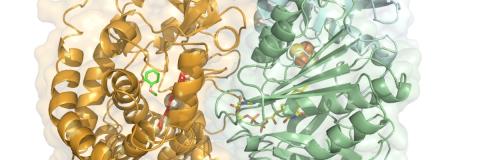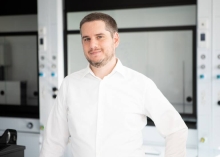
Understanding how the composition and function of biomolecules such as DNA, RNA and proteins allows us to make sense of the world around us, and to make a positive impact on society.
Working at the forefront of modern biochemical and molecular research, the Biophysics and Molecular Genetics group tackles a wide range of critical social and economic problems that face the modern world. Our cross-disciplinary and collaborative work employs techniques and technologies that encompasses molecular biophysics; biochemistry and genomic fields of study and is internationally recognised for its quality and impact.
We work with industrial and governmental partners to tackle the problems of disease, pollution and energy — and our research has helped discover new ways to clean up pollution, provided new medicines and methods for treating genetic disorders, and helped museums educate the public about the past through our work with ancient DNA.
Recent projects have seen members of the group address the growing need for next generation antibacterials, as well as international priorities on clean energy and plastic pollution. We're also directly helping patients with rare genetic diseases as part of the national 100,000 genome project and contributing to fighting the Covid-19 outbreak by sequencing viral isolates as part of the COG-UK consortium.
As well as extensive collaborations with world-leading external organisations we also collaborate extensively within the group, bringing to bear our wide range of molecular expertise on multiple projects, approaching problems from a variety of viewpoints to deliver research of global-reach.
The Biophysics and Molecular Genetics group is also home to two internationally recognised and well funded research centres, the European Xenopus Resources Centre and the Centre for Enzyme Innovation.
Selected recent outputs
Characterization and engineering of a two-enzyme system for plastics depolymerization
Knott, B. C., Erickson, E., Allen, M. D., Gado, J. E., Graham, R., Kearns, F., Pardo, I., Topuzlu, E., Anderson, J., Austin, H., Dominick, G., Johnson, C. W., Rorrer, N. A., Szostkiewicz, C., Copié, V., Payne, C., Woodcock, H. L., Donohoe, B. S., Beckham, G. T. & McGeehan, J., 13 Oct 2020, In: Proceedings of the National Academy of Sciences of the United States of America. 117, 41, p. 25476-25485 10 p., 0.
Macken, William L., Godwin, Annie, Wheway, Gabrielle, Stals, Karen, Nazlamova, Liliya, Ellard, Sian, Alfares, Ahmed, Aloraini, Taghrid, AlSubaie, Lamia, Alfadhel, Majid, Alajaji, Sulaiman, Wai, Htoo A., Self, Jay, Douglas, Andrew G.L., Kao, Alexander P., Guille, Matthew, Baralle, Diana. 25 Feb 2021. In: Genome Medicine. Vol. 13, No. 1. pp. 1-19.
Funders
We've received research funding from major funders such as Research England, the Biotechnology and Biological Sciences Research Council (BBSRC); Wellcome Trust; the National Centre for the 3Rs (NC3Rs); the Defence Science and Technology Laboratory (DSTL), the National Renewable Energy Laboratory, USA (NREL) and Innovate UK, a non-departmental public body that serves as the UK's innovation agency. In total the grouping has brought in excess of £12,000,000 since the last REF period.



Media coverage
Our work is regularly featured in major scientific publications, such as Nucleic Acids Research; the Journal of Molecular Biology; Genes and Development; Journal of Biological Chemistry; The American Journal of Human Genetics; Nature Communications; and Proceedings of the National Academy of Sciences.
Our research frequently makes headlines in the press and engages with wider society, too.
The discovery of a 'plastic-eating' enzyme by Professor John McGeehan achieved global coverage from major media organisations including the Guardian, the BBC, Al Jazeera, CNN and Reuters. Dr Robson's work on the national COG UK effort to track the genomic changes in the Covid-19 virus have also led to media coverage at both local and national level.
Facilities
Our exceptional facilities allow us to take projects from the level of molecular biophysics to molecular genetics: biophysical equipment used by the group at the University includes Nuclear Magnetic Resonance (NMR); analytical ultracentrifugation (AUC) and surface plasmon resonance (SPR) facilities.
Professor John McGeehan also works closely with Diamond Light Source as a powerful tool in molecular structure determination, and next generation DNA sequencing facilities are provided by the Oxford Nanopore GridION platform and downstream analysis is conducted on an in-house computing cluster led by Dr Sam Robson.
There has recently been considerable interest in RNA as a biotechnological tool and we have excellent facilities for high throughput analysis of synthetic RNAs, employing an array technology which has recently been patented by Professor Anastasia Callaghan.
Our work on cellular function, developmental processes and vertebrate gene modification are facilitated by fluorescence microscopy, real-time PCR and micro-CT. Notably, the laboratory of Professor Matt Guille has recently established a rapid pipeline for the testing of gene function in the Xenopus frog model, using advanced CRISPR/Cas technology.
Biophysics and Molecular Genetics Principal Investigators (PIs)
Emeritus
- Professor Steve Wood
- Professor Colyn Crane-Robinson
Discover more Biology research
Marine Biology Research Group
We're researching key environmental issues in marine science such as climate change, biodiversity loss, habitat degradation and ocean acidification.

Ecology and Evolution Research Group
We're expanding knowledge of the diversity of the living world, from molecules to ecosystems, and creating a basis for assessing and reversing the extinction of species.

Biological Sciences
We're exploring how to treat genetic disorders, identifying novel targets for drugs and searching for advances in treatments that could impact millions.








